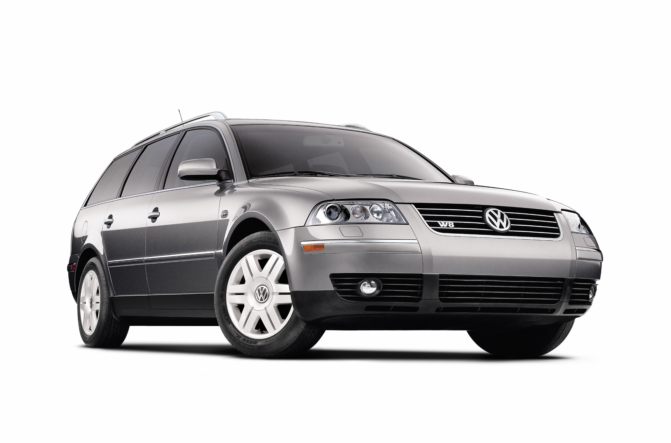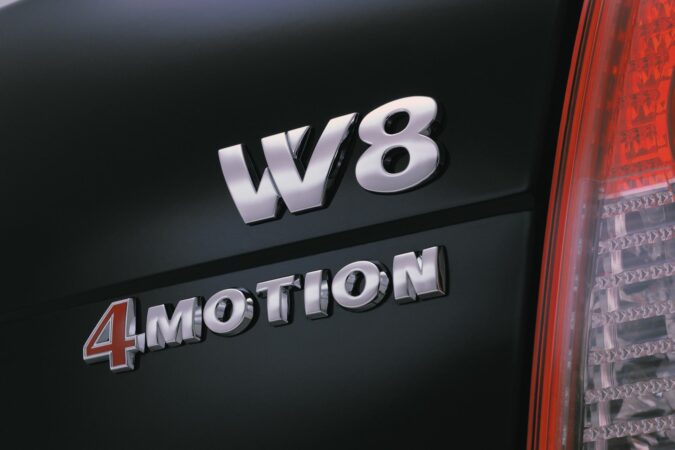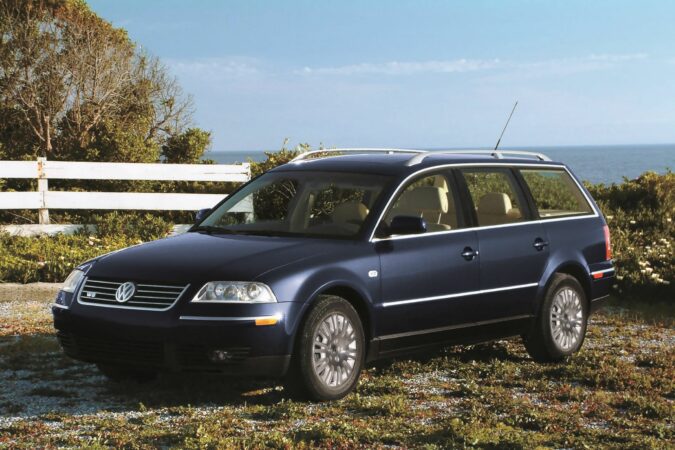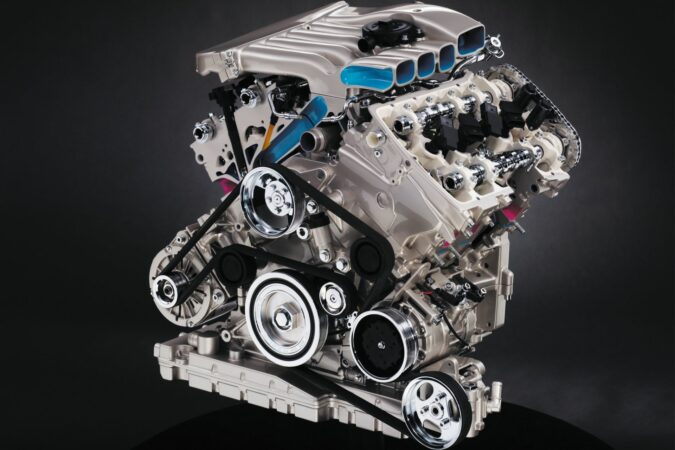Are you interested in learning more about the Volkswagen Passat W8? Well, if that is the case, then you are at the right place because, in this article, there will be quite a bit to cover on this topic and learn about this legendary model.
Doing your own research before you buy is always a good idea because by doing so, you will get the best deal possible. And not only that, but you will also make sure that you don’t end up with a lemon. And when we are talking about the W8 engine, we cannot say anything good, just yet.
First, we need to understand more about the chassis and learn about the VW Passat in general and try to learn the specs of this model. That’s why if you are here for that, then you are at the right place because there will be a lot to cover on this topic.
In this article, we are going to learn what is the VW Passat and learn more about the Passat B5.5 specs. We will cover the dimensions and size, as well as the engines, transmissions, fuel economy, and safety.
And once we clear that, we will solely focus on the W8 engine and try to understand more about it and the common problems from which this engine suffers. So, if you want to learn more, follow along.
VW Passat
Now let’s introduce ourselves to the VW Passat before we dive into the Volkswagen Passat W8. Why so? Well, there are a lot of people who’ve never heard about this car before, who want to purchase the engine but they actually don’t know which Passat model has this engine.
So, we need to make a proper introduction and learn about Passat and most importantly about the model where you can find this engine in. If you didn’t know, the VW Passat is a true legend of a car. And while you’re here, consider checking out our guide on the Passat vs Jetta to see which VW sedan is right for you.
Especially in Europe where these cars are sold in really big numbers since their early inception. Just like the Golf, the Passat is just as popular. And these models also grow steadily here in the US as well with each year selling more and more units.
As of 2022, there is a total of six generations introduced on the market. The original Passat was the B1 introduced in 1973. The B1 Passat basically shared the same body as the Audi 80 sedan. And you will notice this with all of the following generations of the Passat. This model shares a lot with Audi since they are basically twin companies.
In 1981, there was the B2 introduced on the market. But the first modern Passat will only come in 1988 with the introduction of the Passat B3. This was the first Passat to debut in America in 1990. The B4 introduced in 1993, was only a facelift of the B3.
The B5 is the model that followed and the car that we are interested in. This model debuted in 1997 and the B5.5 was the refresh that was introduced in late 2000. With the engine that we are interested in. But more on the Volkswagen Passat W8 up next.
VW Passat B5.5 Specs
Now let’s discuss a little bit about the VW Passat B5.5 before we dive into the Volkswagen Passat W8. Why do we think that this is necessary? Well, a lot of people want to purchase the W8 engine and they don’t even know in which model they can find this engine.
They just know it as the Volkswagen Passat W8. So, we feel the need to further elaborate on the model. Anyway, the Passat B5 was introduced in 1997 and the car was produced until 2005. This new generation shared the same platform with the Audi A4 and the Skoda Superb sold in Europe.
This generation of the Passat is considerably larger than its predecessor and is basically a mid-size car when it comes to the US classification of cars.
What is interesting about this generation was the design. Which rather resembled an eggshell, the overall lines are rounded which helped in reducing the drag coefficient. And the drag coefficient of 0.27 allowed the Passat to move through the air like a knife through butter.
The diesel engine 1.9TDI was able to hit up to 55 mpg. Which is crazy in terms of fuel efficiency. But unfortunately, these diesel engines were not sold in the US. But what about the Volkswagen Passat W8? We will get to that in a bit, let’s first cover the dimensions and size of the model.
Dimensions & Size
Now let’s discuss the dimensions and size of the Volkswagen Passat W8. How long of a wheelbase does this model have?
Well, the wheelbase is about 106.4 inches and has an overall length of 185.2 inches for the sedan, and 184.3 inches for the wagon. The car is 68.5 inches wide and 58.9 inches tall for the wagon and 57.6 inches for the sedan. The overall curb weight is 3,100 lbs. Not a very heavy car after all considering its overall size.
What is interesting is that the model came in both 2WD which was FWD and also a 4WD version. The 4WD version was known as the 4Motion model – one of the most interesting best used sports sedan. This is basically a Quattro drivetrain from Audi. But what about the Volkswagen Passat W8? More on this in a moment.
Engines & Transmissions
In terms of engines, it is worth noting that for the US market, there were only gas-powered engines used on the model. You will never see a diesel Passat B5.5 in the US.
Nevertheless, the main engine used was the 1.8T, which was a turbocharged inline-4 engine. This engine developed about 168hp and 166lb-ft of torque.
But the more preferable option was the 2.8L V6 engine that developed 190hp and 206lb-ft of torque. Bigger engines always sell better in the US.
This is why in 2002, VW decided to introduce the Volkswagen Passat W8 as their top-of-the-line model. But more on this engine, we are going to elaborate later on after we finish the specs of the B5.5 model and see what else is important to cover on this version of the Passat.
In terms of transmissions, there were two options available. The base was a 5-speed manual and a 6-speed manual was also available in the W8 model. There was also the 5-speed automatic.
Fuel Economy
Before we dive into the Volkswagen Passat W8, let’s cover something a bit when it comes to the fuel economy of this model.
The 1.8 Turbo engine delivered excellent fuel economy of 19 mpg in the city and 28 mpg on the highway. With a combined fuel economy of 22 mpg.
The V6 engine performed slightly worse, with 17 mpg in the city, 24 mpg on the highway, and 19 mpg combined.
But the worst in terms of fuel economy was the Volkswagen Passat W8 which reportedly managed to achieve only 12 mpg in the city and 18 mpg on the highway, the combined fuel economy was only 14 mpg.
So, if you want to get one of these, you better be prepared for this low fuel efficiency that comes along with the car. But what about safety? Let’s elaborate more about that next.
Safety
In terms of safety, we can say that this is a solid car. At least for its time, it was one of the best performers. As you probably know, things have changed over the years and this car cannot be compared to a modern Passat in any way, at least not when it comes to safety.
The 1998 model was tested by the IIHS, and on most of the tests, it got really good grades which is the highest rating when it comes to IIHS.
But from the video evidence below that we saw from the testing, we can see a clear deformation of the cage when the car takes the moderate overlap test. And this is not something that you want from a car.
Every modern car is designed to avoid this type of extensive damage that can really affect the safety of the passengers. So, take note when it comes to this aspect. Now let’s move on and discuss the Volkswagen Passat W8 and learn more about this model.
Passat W8
Now let’s move on and discuss the Volkswagen Passat W8 and learn more about this model in general before we dive into the real specs of the W8 engine and also the VW Passat’s common problems and the Volkswagen Passat’s reliability.
As you probably know Volkswagen has created the W16 engine for the Bugatti Veyron, as well as the W12 for the VW Phaeton. This was a completely new engine layout that did not see the light of day before.
Volkswagen saw the inspiration in creating these engines from their very durable 3.6L VR6 engine. So, based on the VR6, they created the W8, W12, and W16. The W8 is basically a VR6 with two banks and two more cylinders.
What is interesting when it comes to the VR6 and later the W engines is that they implement piston layout in a more compact way.
Pistons are a lot closer and installed in a more compact manner compared to the standard V6 and V8 layouts.
This allowed the W8 to be compact as a regular V6 and be able to be installed in the small engine compartment of the Passat.
What is interesting to note about this engine, was that this engine was more of a test bed for new technologies, rather than something revolutionary. VW group just wanted to see how this engine layout will work and if it did well, they would continue making it. Which unfortunately didn’t.
Mainly because of the high price tag. The W8 4Motion Passat started at $37,900. And for a Passat, this was too much. So, these were only made in limited numbers. Not to mention the common problems and the poor Volkswagen W8 reliability. But now let’s cover the specs of the Volkswagen Passat W8.
Passat W8 Spec
Now let’s discuss more about the Volkswagen Passat W8 engine and learn about the specs of the engine itself. What is worth noting first, is that this engine was produced starting from 2001 up until 2004 when the production halted.
It had a short production stint because VW didn’t see the market for this engine and didn’t make further investments in developing and refinement of the engine. Only 11,000 units were produced.
This engine was basically an engine with two VR4 engines mounted in a V configuration at an angle of 72 degrees. But why the engine got the W name instead of V? Well, if you take a look at how a VR6 engine block is designed, you will see that the block is not the same as your standard inline engine.
What is important for this engine is that the total displacement is a total of 4.0L and even though the engine is big in displacement, it is quite compact because of its W-configuration. The engine was 16.5 inches long, 28 inches wide, and 26.9 inches tall. The overall mass of the engine is 419 lbs.
The cylinder bore was 84mm and had a stroke of 90.2mm. In total, the displacement was 499.9cc per cylinder and the compression ratio was rated at 10.8:1. These specs allowed the engine to produce about 271hp and 273lb-ft of torque. With max engine RPM rated at 6,400.
Even though it is a naturally aspirated engine, the numbers are pretty low for the displacement of the engine. And this is one of the factors that made the engine not as popular as expected. If it produced about 370hp, it would have been a completely different story for the Volkswagen Passat W8.
Passat W8 Common Problems
Now let’s learn more about the Volkswagen Passat W8 engine problems. What is worth noting is that this engine has more than a few issues and we need to elaborate on them in detail so you know what you are getting yourself into.
We will only focus on the five biggest problems with this engine. So, if you want to learn more about the issues, please follow along.
Volkswagen Passat W8 Problems #1: Camshaft Adjuster Failure
Now let’s take a look at the first problem of the Volkswagen Passat W8. And this is the camshaft adjuster failure. This is mentioned by a lot of people on the VW forums. But they don’t precisely tell what a camshaft adjuster is. So, let’s explain it.
As you probably know, each modern car has variable valve timing. The variable valve timing is a mechanism that with the help of engine oil (with the oil control valve), advances or retards the position of the intake and exhaust camshafts. And this makes the engine work smoother and more efficiently.
And for this purpose, there are camshaft adjusters. Also known as VVT solenoids. On the W8 engine, these solenoids are mounted on a single housing. They basically activate and readjust the camshafts when needed.
And when they fail, the engine is no longer able to adjust the timing for maximum efficiency. And replacing one of these could easily cost you a few hundred dollars. When these solenoids fail, you might experience the check engine light, rough idle, and misfires.
As far as diagnosis is concerned, you might be able to spot a P0011, P0012, or P0013 OBD error code, as common symptoms of faulty variable valve timing. Now let’s continue with the next Volkswagen Passat W8 problems.
Volkswagen Passat W8 Problems #2: Excessive Oil Consumption
The second biggest problem with this engine is excessive oil consumption. The oil consumption of this engine is one of the downsides.
This happens more often in the 2002 model year. But it can be also present on other models as well. Symptoms of oil consumption are the lack of oil, blue smoke from the exhaust, low oil light indicator on (and figuring out how to reset the oil change light and how to reset the oil light and how to reset oil light), decreased fuel efficiency, and engine wear.
Especially on the camshafts and the rod bearings. Such oil consumption issues are similar to some Subaru models, back in the day. Now let’s continue with the next Volkswagen Passat W8 problems.
Volkswagen Passat W8 Problems #3: Bad Fuel Gauge Senders
The next problem on our list of problems with the Volkswagen Passat W8 is the fuel gauge sender.
This component is in charge of checking the gas level inside the tank. And this sending unit consists of the float, a metal rod, as well as a variable resistor.
There could be too many deposits on the variable resistors and this will make the fuel gauge not work well. The gauge could read empty, or full, or you will experience erratic readings from it. The key thing is to replace this component in order to solve the Volkswagen Passat W8 problem.
If you want to attempt a DIY fix, you can check out our guide on how to fix a faulty gas gauge, to learn more.
Volkswagen Passat W8 Problems #4: Torque Converter Failures
The next problem on our list of issues of the Volkswagen Passat W8 is the torque converter failure. This is a problem that is very common in the automatic transmission model. So, what is a torque converter on your car?
Well, a torque converter is a fluid coupling device that is installed between the transmission and the engine. This fluid coupling device has a role to help the engine prevent stalling while in neutral and other important tasks.
The important bit is that this torque converter can fail more often on these vehicles and trigger a check engine light with the error codes P0740 and P0741. Therefore, you have to be diligent about noticing these symptoms of a bad torque converter, or even a torque converter clutch solenoid, early on.
There could be also slipping gears, overheating, and even transmission fluid leaks. The torque converter replacement cost can cost well above $1,500 (if you want to learn more, check out our explainer on the B&M torque converter and the best torque converter).
Volkswagen Passat W8 Problems #5: Catalytic Converter Failures
Catalytic converter failures are also very common on these engines as well. Mainly because of a bad engine where your car is burning too much oil or if your car is also running rich.
Both of these states can affect the catalytic converter and clog it up. And when the catalytic converter gets clogged up, you will experience problems like black smoke from the exhaust, engine stalling, check engine light, and even failing the emissions testing. So, be really aware of this problem with the Volkswagen Passat W8.
Therefore, be wary of the signs of a bad catalytic converter, as well as the symptoms of a clogged catalytic converter. Note that you can still learn how to fix a catalytic converter without replacing it, in addition to how to unblock a clogged catalytic converter.
All you need to do is begin by removing the catalytic converter and diagnosing its condition. If the clog isn’t too bad, you can handily clear up the clogging using a catalytic converter cleaner. Even DIY solutions such as using lacquer thinner as catalytic converter cleaner can work, too.
Volkswagen W8 Reliability
When it comes to the reliability of the Volkswagen Passat W8, we cannot say many good words. Mainly because this engine was produced in very limited numbers. A total of 11,000 units were made. And this is nothing for an engine.
Still, with its complexity, we can say that it is more difficult to fix. But we cannot say that this is a more complex engine than a modern V6 3.0L TFSI engine or any other modern VW engine in V or W configuration.
Considering that the engine is low performance and produces only 270hp, we would not recommend it. Since there are similar engines that produce a lot more power compared to the W8 and are more fuel efficient. But if you want to drive something really unique, you might want to give it a try if you can find one on the cheap.
For greater context, be sure to check out our write-up on how long do VW cars typically last and Volkswagen cars’ overall reliability as a general guideline for how well they age and perform. While some VWs are long-lasting and reliable, not all of them are as good.
In Conclusion…
In this article, we covered quite a bit when it comes to the Volkswagen Passat W8. We learned first about the Passat model and the B5.5 generation. We covered the specs and all the interesting numbers.
Then we focused on the W8 engine. We learned what this engine is in general and also the specs of this engine comes in. After that, we learned about the problems that this engine has and its reliability.
Frequently Asked Questions
Now let’s answer some frequently asked questions.
Who Makes Volkswagen
Volkswagen is made by Volkswagen. They are the mother company that owns the Volkswagen badge. As well as, Audi, Porsche, Lamborghini, Skoda, Seat, and Bugatti. The company is located in Wolfsburg, Germany.
Is A Volkswagen A Good Car
VW is known to make really good cars. But their gasoline engines, especially the newer direct injection engines TFSI are not that famous for their reliability. Mainly because they create a lot of carbon buildup and can have a lot of other issues as well.
Is Volkswagen A Luxury Brand
No, VW is not considered to be a luxury brand. They were always marketed as the car for the average Joe. But they introduced some luxury models in the past and even now with the VW Arteon.
How Long Do VW Last
Their diesel engines would basically last forever. Some of them can even hit 1 million miles. But gas-powered engines are not as reliable. They last on average somewhere between 150,000 and 250,000 miles, depending on the level of maintenance that went into the engine.
How Much Is a Volkswagen
The price depends on the model. Not all models are valued the same. Some are cheaper, some are more expensive. One of the better models that VW makes for the US market is the Tiguan. You can find this SUV for an MSRP of about $28,245.
Are Passats Reliable
Yes, they are really reliable. But the main aspect of the Passat is the engine. Some of the engines are more reliable than others. So, you might benefit from performing good research when it comes to engine problems before you buy.




